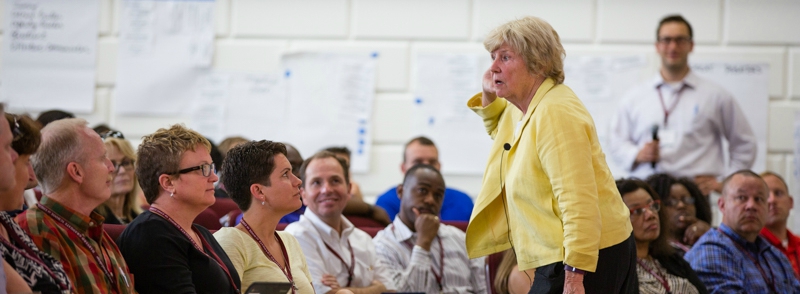 | |
| 10 обязательных навыков студента Гарвардского университета
Навык №7. Лидерство Что такое лидерство, из чего оно состоит и почему каждый достойный университет или компания в США хотят видеть в своих рядах “лидеров”? В различных контекстах лидерство приобретает разные значения. Нередко лидерство присваивают человеку, который преуспевает в той или иной области. Такая трактовка больше относится к “персональному лидерству”, которое предполагает управление личной жизнью, постановку и достижение личных целей. Понятия персонального лидерства и лидерства, которое ищут университеты и компании, имеют фундаментальные различия. В отличие от персонального лидерства, лидерство - это процесс, в котором человек или группа людей объединяют и мобилизуют других участников (последователей) ради достижения общей цели. Эффективное лидерство трансформирует цели и амбиции последователей, иногда даже их идентичность и заменяет само-ориентированное поведение на командное мышление. Согласно этому определению, такие личные достижения как “быть отличником в классе”, “показать лучший результатов в спорте” или “перевыполнить плана продаж” не являются примерами лидерства, так как в таком контексте отсутствует участие человека в объединении и ведении команды к общей цели. Понимание нюансов термина позволит вам лучше определить ожидания приемной комиссии вуза или будущего работодателя, и привести более эффектные примеры из предыдущего опыта, подтверждающие наличие того или иного навыка.
| |
 | |
Желание приемных комиссий и компаний видеть в своих рядах лидеров понятно. Лидерские качества предполагают наличие у кандидата десятка других особенно привлекательных качеств:
Неужели все студенты Гарварда - лидеры? В какой-то степени, это так. Учитывая разнообразие академических дисциплин, социально-культурных групп и внеучебных клубов, университетам необходимы лидера в каждой области, чтобы обеспечить устойчивое и разнообразное развитие всей системы, которое будет эффективно поддерживаться самими студентами. Поэтому если на первый взгляд студент вам покажется тихим и застенчивым, и в принципе не очень разговорчивым, не стоит делать поспешных выводов и думать, что приемная комиссия совершила ошибку. Когда вы узнаете немного больше о том, как проводит свое внеклассное время этот студент, то, наверняка, сразу определите, в чем заключается его лидерство. Поэтому поступая в университет не пытайтесь показать, что у вас есть какие-то “модные” увлечения, а сфокусируйтесь на истинных интересах, в рамках которых вы свободны вести и ведете других.
| |
| |
Одним из излюбленных вопросов вступительных эссе на все уровни образования в топовые университеты США, или на собеседованиях в привлекательные компании является просьба рассказать про ситуацию, где вы продемонстрировали лидерские качества. Этот вопрос относится к ситуационному типу вопросов, который требует анализа желаемого навыка через призму конкретного жизненного опыта. Такую ситуацию я бы рекомендовала всегда иметь в заготовке, потому что, когда кандидат внезапно с ним сталкивается он часто оказывается в ступоре и/или дает слишком общий ответ. Размышление-рефлексия на тему своего “лидерского опыта” является полезным упражнением для анализа своих увлечений, а также выявления именно тех, которые вы реализуете в качестве лидера, объединяя команду. Определив круг таких увлечений, ответьте на следующие вопросы для каждой из них:
Ответы на эти вопросы в контексте определенного лидерского опыта позволят вам выстроить развернутый рассказ о вас как о лидере, который имеет цели, мыслит стратегически, берет ответственность за команду и за результат, умеет собрать и сплотить команду, а также преодолевать сложности. Эти вопросы применимы к любой сфере и в контексте любого профессионального, академического, спортивного, внеучебного и прочего опыта. В следующий раз, когда вас попросят рассказать о лидерском опыте, вы будете знать, что тот факт, что вы были отличником в классе или у вас лучший результата по прыжкам в длину, а может самый высокий показатель продаж в компании - все это относится больше к личным достижениям, а не к лидерскому опыту как таковому. Если жи вы затрудняетесь ответить на первые два вопроса - тогда поиск этих ответов станет своевременной и благородной целью на ближайшее будущее! | |
Автор: Евгения Ефремова, студентка магистратуры Harvard University
| |
| ← Читайте статью о 6 навыке | Читайте о 8 навыке на следующей неделе→ |
В статье использованы фото с мероприятий из Harvard University, опубликованных на сайтах www.raiseyourhandtexas.org и https://techcrunch.com | |
Запишитесь на консультацию и узнайте, как освоить английский и поступить за рубеж в вашем случае
Сразу после вы получите курс подготовки к IELTS в подарок и бесплатное занятие



 Факты о нас
Факты о нас 

